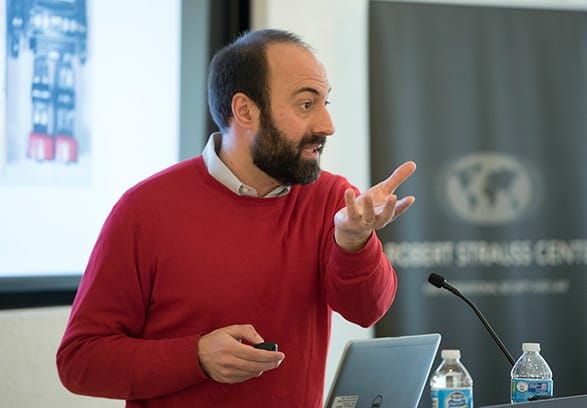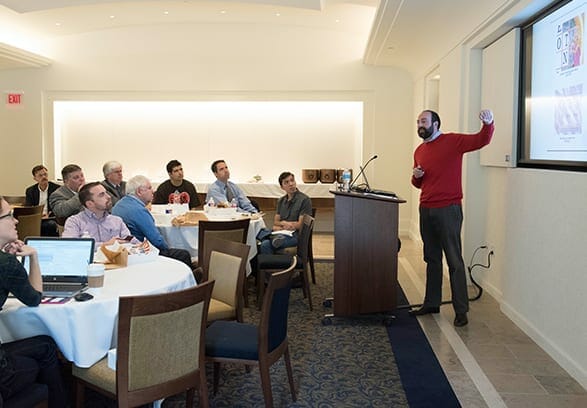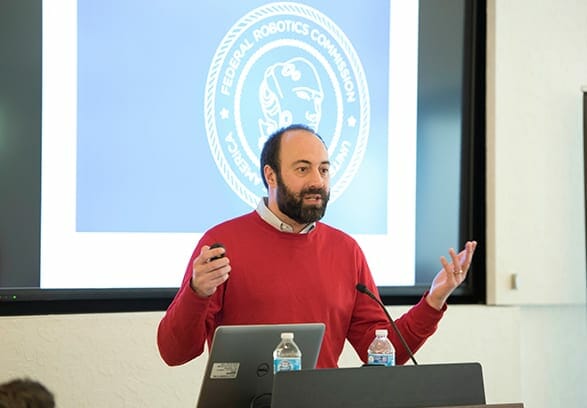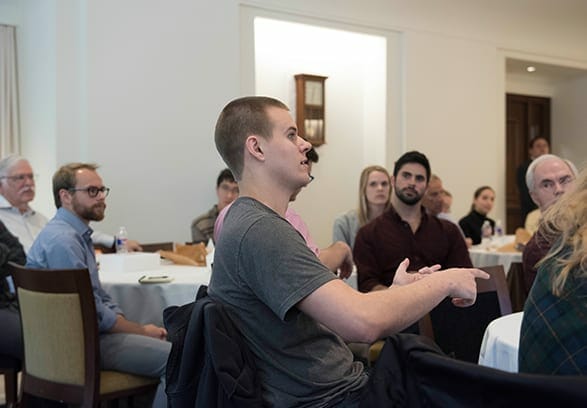By Program

Robots in American Law
March 22 - March 22, 2016 | 11:30:00 | Sheffield Room, UT School of Law

On Tuesday, March 22, the Robert Strauss Center welcomed Ryan Calo, Assistant Professor at the University of Washington School of Law and director of the UW Tech Policy Lab, to speak about the history of robots in American courts, and what these strange and varied cases can tell us about the future of robotics law. His presentation, “Robots in American Law”, began with an overview of his research of hundreds of state and federal cases dealing with robotics, and concluded with ideas about how the puzzles driven by robotics may play out in contemporary American law.
Photos of this event can be accessed here.

Calo defines robot with the “sense, think, act” computer science definition. These three robotic traits present challenges to law in the realms of privacy, mens rea and intent, and foreseeability, among others. In his research, Calo has grounded his predictions for robotics in comparison to Internet case law. However, he points out that Internet case law mostly deals with “bits”, virtual action at a distance. Robotics can carry out physical action at a distance, which may result in physical harm, and victims without perpetrators. Microsoft, for example, is not responsible for lost data from a software glitch. But the legal balance could change when courts are considering “bones, not bits”, as they might in the case of an accident involving a driverless car. However, Calo emphasized that the law will be able to adapt, and the benefits from advancing robotics technology will far outweigh the harm.

Although robotic advances in areas such as driverless cars present some novel issues, courts have been dealing with robots for far longer than the Internet. Calo found robotics cases dating back into the 1940s and 1950s, and dozens from later decades that involved robots in a substantive way. In some of these cases, courts struggled to answer the question, “Can a robot represent a person?” Did a Vanna White robot in a Samsung commercial violate her right of publicity? Were robot toys subject to the special lower tariff for dolls? Could robots give a musical performance? Other cases looked to the question of whether a robot can extend a person. For example, could theft carried out via robots or robotic machines be considered burglary, which requires physical entry? Could a shipwreck discovered by a robotic submarine be claimed by the team operating it? Courts established a four-part test for “telepossession” that is still in use today.

Calo concluded that the line between people and instrument is a difficult one for the courts. Judges tend to have a problematic mental model of robots. While the case law tends to treat robots as nondiscretionary, contemporary robots are capable of surprise and spontaneity. While judges ruled that Chuck-e-Cheese’s animatronic band members couldn’t be taxed as performers, Calo assured the audience that robots today are capable of artistic and extemporaneous performances. New autonomous submarines, similar to the Mars Rover, explore the ocean floor without explicit directions from operators, posing a challenge to the telepossession test established in the shipwreck case.

Calo suggests that over time, robotics policy will come not only from the courts, but also from the National Highway Traffic Safety Administration and the Federal Aviation Association. The best way to keep up with robotics will be a mix of case law and legislation. As robotics presents policy opportunities and dilemmas in various agencies, Calo has proposed a new Federal Robotics Commission to bridge the gaps between policymakers and scientists. In the meantime, he is working at the Tech Policy Lab to develop a methodology for assessing the impact of emerging technology on the law, as well as deepening his research on particular facets of robotics case law.
His article on the history of robotics case law can be found here.
Video of this event can be accessed here.
“A conversation with Ryan Calo” can be accessed here.
Ryan Calo is an assistant professor at the University of Washington School of Law and an assistant professor (by courtesy) at the Information School. He is a faculty co-director (with Batya Friedman and Tadayoshi Kohno) of the University of Washington Tech Policy Lab, a unique, interdisciplinary research unit that spans the School of Law, Information School, and Department of Computer Science and Engineering. Professor Calo is a CoMotion Presidential Innovation Fellow for the class of 2015.
Professor Calo’s research on law and emerging technology appears or is forthcoming in leading law reviews (California Law Review, University of Chicago Law Review, Stanford Law Review Online, University of Pennsylvania Law Review Online) and technical publications (MIT Press, IEEE, Science, Artificial Intelligence), and is frequently referenced by the mainstream media (NPR, New York Times, Wall Street Journal). Professor Calo has also testified before the full Judiciary Committee of the United States Senate and spoken at the Aspen Ideas Festival and NPR’s Weekend in Washington. In 2014, he was named one of the most important people in robotics by Business Insider.
Professor Calo is an affiliate scholar at the Stanford Law School Center for Internet and Society (CIS), where he was a research fellow, and the Yale Law School Information Society Project (ISP). He serves on numerous advisory boards, including the University of California’s People and Robots Initiative, the Electronic Frontier Foundation (EFF), the Electronic Privacy Information Center (EPIC), Without My Consent, and the Future of Privacy Forum.
Professor Calo worked as an associate in the Washington, D.C. office of Covington & Burling LLP and clerked for the Honorable R. Guy Cole on the U.S. Court of Appeals for the Sixth Circuit. Prior to law school at the University of Michigan, Professor Calo investigated allegations of police misconduct in New York City.


